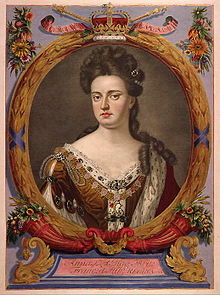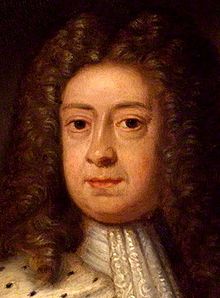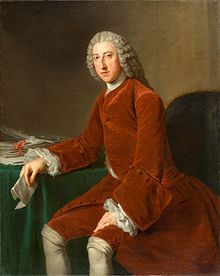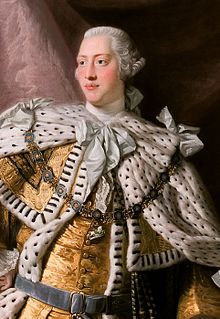History of the Kingdom of Great Britain

The history of the Kingdom of Great Britain includes the history of the territories of England (including Wales ) and Scotland, which have been combined as the Kingdom of Great Britain since the Act of Union of 1707 . With the Act of Union of 1800 , Ireland , which had previously been legally independent, came into this association. In this century, resistance to the Anglo-Scottish Union subsided, and domestic disputes unfolded between the now consolidated parties of the Whigs and Tories. Outwardly, the kingdom expanded its colonies, even if the North American branches became independent and were thus lost. Economic development left the rest of Europe behind and finally culminated in the Industrial Revolution .
Consolidation under the House of Hanover
Creation of the Kingdom of Great Britain
William III. died in 1702 in the midst of preparations for a new war against France. The rule took over his sister-in-law Anne . She immediately declared the war against France and Spain, which was prepared under Wilhelm, and was thus drawn into the War of the Spanish Succession . In 1712 Louis XIV was finally forced to abandon his support for the descendants of Jacob II and to accept a regulation for succession to the throne for England and Scotland presented by the English parliament . In addition, England was granted some colonial territories and trade privileges, which ultimately made it one of the strongest colonial powers. The politics of religion meanwhile remained the decisive domestic political issue. In the Anglican Church, the distinction between the High Church , which was close to the royalist Tories, and the Low Church on the part of the Whigs, who were close to the landed gentry, developed. The disputes between the Whigs and Tories, who were increasingly developing in the direction of modern political parties, determined the political landscape in England from 1700 onwards.
From 1706 onwards, the English Parliament pushed Scotland into full political union with England. The fear of worse conditions, especially of an economic nature, in the event of refusal and massive bribery led to the Scottish Parliament accepting the offer. England and Scotland were eventually united to form the Kingdom of Great Britain under the Act of Union 1707 . Anna became the first “British” Queen, and the House of Hanover was established as a common ruling dynasty. The Parliament of England was transformed into the Parliament of Great Britain. The House of Commons was expanded by 45 Scottish MPs and the House of Lords by 16. Customs were no longer imposed on the border between the two states. However, English law was not transferred to Scotland and some Scottish institutions were not merged with their English counterparts; these include the Bank of Scotland and the Church of Scotland .
The Whig epoch
The Protestant succession to the throne was established by the Act of Settlement in 1701, so that after Anne's death in 1714 the crown fell to George I from the House of Hanover ( Welfen ). George relied on the Whigs , who, unlike the Tories, had unconditionally adhered to the Protestant line of succession. The Whigs occupied most of the key political positions in Great Britain through both the new king’s mandate practice and the general election in 1715. After a Jacobite uprising in Scotland and parts of northern England in the same year, various political rights were restricted and the parliamentary term increased from three to seven years, which cemented the dominance of the Whigs for a long time. Tensions mainly played out within the dominant party: after Great Britain had allied itself in the Triple Alliance with France and the Netherlands and intervened in the Great Northern War , part of the Whigs split off and entered parliament in opposition to the government. In 1720 Robert Walpole prevailed as the strong man of the Whigs, who ended a financial crisis as Chancellor of the Exchequer and became the first Prime Minister of Great Britain. Walpole secured his position primarily through his outstanding financial skills. With the sinking fund , he created a system that gave British government bonds an unprecedented level of stability and thus gave the state an enormous creditworthiness . His mercantilist trade policy encouraged exports and imposed high taxes on imports into Great Britain. For the next 20 years, Walpole controlled virtually all government offices and bishops' seats and the voting behavior of Whig MPs in the House of Lords. He exerted great influence on the House of Commons through his financial means: Since the constituency division was still based on the structure of the Middle Ages, there were many rural constituencies that could be bought by paying a few eligible voters. In contrast, comparatively modern political election campaigns took place in the urban constituencies.
Above all, Walpole's foreign policy aroused resistance. While he was trying to secure peace with France and Spain through treaties, a warring party formed within the Whigs, which grew in size over the course of several trade disputes, especially with Spain in the Caribbean. Walpole seems to have recognized the change in opinion against his foreign policy concept and resigned after an unfavorable lower house election in 1742 during the reign of George II (1727-1760).
The relationship between England and Scotland remained tense during this period. In 1715 a conspiracy against George I in favor of a Stuart king was uncovered, in which English members of parliament had also participated. Shortly thereafter, an armed uprising broke out in Scotland, which a vastly outnumbered English army put down at the Battle of Sheriffmuir . In January 1716, however, James Francis Edward Stuart landed in Scotland and proclaimed himself king there under the name Jacob VII, but fled again after a few days. In the decades that followed, the Scottish population was systematically disarmed and roads built into the country's inaccessible areas. In 1745 Charles Edward Stuart , known as Bonnie Prince Charlie , landed in Scotland undetected, claiming that he had made a military alliance with France. Encouraged by this, he was joined by a small insurgent force, which achieved initial successes against the English. When no general uprising developed after operations in northern England, the pretender had to admit that in reality he could not expect any French arms aid. Part of his army then disbanded. With the rest he was defeated on April 16, 1746 at Culloden . There followed a bloody wave of purges in the Highlands, after which Scotland was finally subjected. At the same time, however, many Scottish nobles began to make careers in the English army, which promoted integration into the Kingdom of Great Britain. Scotland also began to bind itself economically to England, primarily through the production of slaughter animals, which were popular in the growing cities of the south, and increasingly with the mining of coal.
The end of Whig dominance
The unfavorable course of the War of the Austrian Succession for Great Britain forced George II to fill government offices with Tories again from around 1745 in order to give his ailing rule a broad political base. In 1747 Great Britain withdrew from the War of Succession, mainly because of the heavy burden on public finances. A consolidation phase followed under Prime Minister Henry Pelham , which in turn was followed by a phase of rapidly changing governments that were barely able to act. British politics did not take shape until after the troubled times of the Civil War, the Commonwealth and the Glorious Revolution, and the desire for stability was reflected in culture and science. This was expressed in the emergence of classicism in various artistic disciplines, as well as in the rationalism of the sciences. Classicism was also strengthened by the foreign policy and military successes after which Great Britain saw itself as the successor to the Roman Empire. In the philosophy of science, especially with John Locke and David Hume, the main representatives of the British Enlightenment, a strict empiricism prevailed.
Classicism was most clearly reflected in architecture. Richard Boyle enforced this style with reference to the Roman architect Vitruvius. Great Britain became style-forming for the whole of Europe through the development of the English Garden. In painting, Joshua Reynolds in particular introduced the "Classical Age". In addition to the predominant genre of portrait painting, he also tried to introduce history painting. In the figure of William Hogarth, an early form of realism developed that was already socially critical. The music of the era was shaped by George Frideric Handel and the transition from opera to oratorio that he made. In prose literature, the novel prevailed as the dominant form, while poetry generally enjoyed a higher reputation and increasingly developed in the direction of natural poetry. The common tragedy gained importance as a new dramatic form. again from 1756 with William Pitt the Elder . Under him, who was only Secretary of the State but acted like a Prime Minister, Great Britain intervened in the Seven Years War (1756–1763). This was preceded by repeated clashes with French troops and ships, especially in the colonies on different continents. After only minor successes in the first years of the war, British troops achieved a number of victories in 1759. As a result of the war, Great Britain won all of the French colonies in North America as well as territories in Africa and India. The British troops had a hard time in the Central European theater of war, but above all Frederick the Great , who was supported financially by Great Britain in particular, did not meet military expectations. Because of the high war spending, displeasure against Pitt grew. However, British politics began to actively campaign for an end to the war only after the death of George II, because his successor George III. was willing to renounce the home country Hanover.
In the 18th century the Church of England experienced both a phase of secession ( Methodism ) and dissenting opinions ( Unitarians , Deism ) as well as a consolidation in its main stream, which was connected with close ties to the state and the nobility. Thus a new benefice system developed, in which ecclesiastical offices were awarded by the crown or the nobility. The deviating currents of the Dissenters were increasingly tolerated in the phase of dominance of the Whigs and bundled into a manageable number of sub-forms. Catholicism continued to be fought by the state and fell significantly.
Economy and Society in the Early 18th Century
Admittedly medical and hygienic advances reduced the impact of diseases on population development, but in the first half of the 18th century several crop failures and epidemics such as typhus , dysentery and smallpox limited population growth. In 1761 there were around 6.7 million people in England and Wales and around one million in Scotland. The population did not explode until the second half of the century. A broad stratum of the middle middle class slowly began to form. From around 1700 onwards, the poorest sections of the population were confronted with even more stringent poor legislation.
Agriculture, by far the most important branch of the economy, experienced a new wave of intensification, which caused production to rise significantly. With the initially still slow increase in industrial production, the need for transport connections grew, to which the response was to build more canals. After the troubled times of the Civil War, the Commonwealth and the Glorious Revolution, the desire for stability was reflected in culture and science. This was expressed in the emergence of classicism in various artistic disciplines, as well as in the rationalism of the sciences. Classicism was also strengthened by the foreign policy and military successes after which Great Britain saw itself as the successor to the Roman Empire. In the philosophy of science, especially with John Locke and David Hume, the main representatives of the British Enlightenment, a strict empiricism prevailed.
Classicism was most clearly reflected in architecture. Richard Boyle enforced this style with reference to the Roman architect Vitruvius. Great Britain became style-forming for the whole of Europe through the development of the English Garden. In painting, Joshua Reynolds in particular introduced the "Classical Age". In addition to the predominant genre of portrait painting, he also tried to introduce history painting. In the figure of William Hogarth, an early form of realism developed that was already socially critical. The music of the era was shaped by George Frideric Handel and the transition from opera to oratorio that he made. In prose literature, the novel prevailed as the dominant form, while poetry generally enjoyed a higher reputation and increasingly developed in the direction of natural poetry. The common tragedy gained importance as a new dramatic form. Foreign trade experienced a significant boom, in the course of which many monopoly companies such as the Merchant Adventurers lost their importance in the late 17th century . More and more trading lines were opened to private merchants, with the American and Levant trade in the hands of privileged companies. The boom in maritime trade brought among other things the development of the insurance industry and strong growth in shipyards .
Spiritual Life in the Early 18th Century

After the troubled times of the Civil War, the Commonwealth and the Glorious Revolution, the desire for stability was reflected in culture and science. This was expressed in the emergence of classicism in various artistic disciplines, as well as in the rationalism of the sciences. Classicism was also strengthened by the foreign policy and military successes after which Great Britain saw itself as the successor to the Roman Empire . In the philosophy of science, especially with John Locke and David Hume , the main representatives of the British Enlightenment, a strict empiricism prevailed.
Classicism was most clearly reflected in architecture. Richard Boyle enforced this style with reference to the Roman architect Vitruvius . Great Britain became style-forming for the whole of Europe through the development of the English Garden . In painting, especially Joshua Reynolds introduced the "classical age". In addition to the predominant genre of portrait painting, he also tried to introduce history painting. In the figure of William Hogarth , an early form of realism developed that was already socially critical. The music of the era was shaped by George Frideric Handel and the transition from opera to oratorio that he made . In prose literature, the novel prevailed as the dominant form, while poetry generally enjoyed a higher reputation and increasingly developed in the direction of natural poetry. The common tragedy gained importance as a new dramatic form .
Colonial expansion and imperial crisis
Attempts at reform and increasing dissatisfaction
The British colonial empire developed from several approaches: trading bases of small area had emerged on the African and Indian coasts, many Caribbean islands had been developed over large areas in order to establish plantations there, in North America emigrants, often of their deviating religious or political opinion, had to agree Moved to this step, settled down and formed communities. The colonies were hardly politically noticed in the 17th and early 18th centuries. In addition, the North American colonies initially played a minor role economically, but this soon changed with the strong population growth there (1700: around 250,000 inhabitants, 1774: around two million). The political interest in the colonies began to grow with the increasing involvement of the other European powers in these areas. The clashes of the Seven Years' War between Great Britain and France also took place over the colonial empires of both nations. The Peace of Paris in 1763 brought about an increase in British possessions in North America and India at the expense of France.
With the accession to the throne of George III. In 1760 the political ruling class also reformed. The new king appointed members of parliament to important offices who were not bound by their ties to Whigs or Tories, but by the economic and social interests of their constituencies and by their personal loyalty to the king. With this leadership group, he initially tackled the end of the Seven Years' War and the consolidation of the state budget, which had been badly damaged by the war. As part of this effort, taxes were also imposed on the North American colonies, which led to determined opposition, attacks on royal officials and a boycott of British goods.
There were also outbreaks of discontent with the Crown in Great Britain. The publisher John Wilkes achieved high popularity after he had published unprecedented critical articles against the king and was therefore legally prosecuted. After several public appearances, he was elected to the House of Commons in 1768 and served his sentence, which resulted in demonstrations for his release. The government announced several new elections for Wilkes' constituency and, despite repeated victories, finally dismissed his mandate. This arbitrary approach led to ever louder calls for constitutional reform. In 1769, the Society of Supporters of the Bill of Rights was formed , which wrote an electoral reform on the flags. The main aim was to compensate for the imbalance between the rural constituencies with a small population that had existed since the Middle Ages and the densely populated urban constituencies. The lack of equalization up until then meant that urban votes had only a fraction of the weight of rural votes. In the 1770s, several movements and interest groups formed which, in the spirit of the Enlightenment, called for a rationally structured political order, which included, among other things, an extension of the right to vote to the entire male population and a reduction in the power of the king. The potential for revolt in the London population became apparent in 1780, when the Gordon Riots broke out following legislative proposals for Catholic emancipation , during which Catholic embassy chapels were devastated and Catholics discovered were mistreated.
The loss of North America and the national movement in Ireland
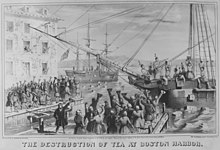
The tax disputes of the early 1760s had influenced public opinion in the 13 North American colonies against the motherland. As in 1773, the East India Company was given a monopoly on the Teeimport in the colonies and of smuggling and tax evasion have been prevented, it came to the resistance in the form of the Boston Tea Party occurred on 16 December 1773. In April of the following year the First Continental Congress of Colonies together, giving themselves a solid organization for the first time and raising a common army. Great Britain reacted to this by excluding the colonies from foreign trade. Shortly afterwards, the first fighting of the War of Independence broke out. At first the conflict remained of low intensity because the colonies first had to build up their army and the British troops had to be brought across the Atlantic. On July 4, 1776, the rebels issued the United States' Declaration of Independence . The first major defeat for the British was the surrender of General Burgoyne on October 17, 1777 in Saratoga. France joined the war in 1778 and Spain in 1779 on the side of the rebels, expanding it to the European and Indian arenas. With the surrender of Yorktown on October 19, 1781, the war for George III. lost militarily. Politically, a parliamentary resolution of February 27, 1782, which called for an end to the war and triggered a government crisis, represented the decision. The Peace of Paris in 1783 officially ended the War of Independence and recognized the United States of America as a sovereign state.
Ireland was ruled by a thin Protestant class in the 18th century. The Catholics were oppressed. However, a wealthy Catholic bourgeoisie, consisting mainly of merchants, had formed. From this group, demands for equality grew louder, which were increasingly taken up by the Catholic masses and were given additional impetus by the events in America. On the other hand, volunteer regiments were formed to defend against a French invasion when the Crown moved troops from Ireland to America. This loyalty was rewarded with the first Catholic Relief Act in 1778 , which made Catholics better off, especially on land ownership issues. In 1780 there was an equality with Great Britain in colonial trade, in 1782 the Irish parliament was upgraded, from which only the Protestant upper class benefited. In 1789, also inspired by the French Revolution , the United Irishmen were formed , who strived for an Irish nation with equal rights for both denominations. This was the first time the Irish national movement had a large number of Protestant advocates. In 1793, Catholics were given access to judicial offices, the right to vote and the right to bear arms. Despite these concessions, the Irish national movement negotiated with the French and persuaded them to attempt an invasion in 1796, which failed. In rural areas in particular, nationalist secret societies were formed, the majority of which did not share the integrative nationalism of urban intellectuals, but strove for a Catholic Ireland. Their actions led to an excessively harsh British military operation in 1798, which in turn provoked open uprisings. A total of around 30,000 people died during these clashes.
The era of Pitts the Younger
Under Prime Minister Charles Watson-Wentworth, 2nd Marquess of Rockingham , from 1782 the liberal demands prevailed up to the state leadership. Not only did he end the American War of Independence and begin consolidating the state budget, but he also pushed ahead with the unbundling of parliamentary mandates and links with the court.
Under the government of William Pitt the Younger , reforms began to take off in 1783. For financial restructuring he resorted to the means of sinking funds , canceled most state pensions and lowered tariffs, which made smuggling uninteresting and thus increased tariff revenues in total. He used the money he won to upgrade the navy. In a first difficult phase of the mental illness of George III. from October 1788 to February 1789, Pitt succeeded in largely keeping the heir to the throne, the later George IV, out of the reign.
With the storming of the Bastille in France, the voices in Great Britain calling for universal suffrage for all men grew louder. For the first time since the time of the civil war, the political disputes spread to broad circles of the bourgeoisie and the lower classes. In the context of the political discussion, an extensive political literature developed, in particular by Edmund Burke and Thomas Paine . When the British radicals made contact with the French revolutionaries in 1794 and 1795, the government revoked numerous civil liberties, whereupon the reform movement went underground.
In terms of foreign policy, the government under Pitt initially reacted cautiously to the French Revolution and stayed out of the revolutionary wars . Even after revolutionary France declared war on Great Britain on February 1, 1793, the British government initially engaged itself primarily with support payments for the warring monarchies on the European theater of war. Militarily, the British were mainly active in the French and Dutch colonies in the Caribbean, later on Ceylon and later in South Africa . After the monarchical front in Europe began to crumble with the peace of Basel in 1795 and the Austro-French peace treaty in 1797, Russia and Great Britain faced revolutionary France alone. The British had the largest fleet of the time, but no army capable of acting on the continent. At the same time, Great Britain was weakened by an economic crisis that led to the introduction of a general income tax for the first time . Not least because of this massive financial burden, a peace treaty with France was popular among the population, which finally took place in 1802 with the Peace of Amiens under Pitt's successor Henry Addington .
Economic and social development in the late 18th century

The Industrial Revolution began to unfold in Great Britain as early as the 18th century . However, their full economic and social effects did not become apparent until the 19th century.
There are several reasons that this process began in the British Isles. Not least after the religious disputes of the civil war, a largely rational worldview based on reason and natural sciences prevailed, which promoted technical inventions and the effective organization of work processes. There was also no serfdom , which encouraged the rural population to migrate to the cities and thus the formation of a proletariat . The low population growth until 1760 favored the development of machines to replace the expensive human labor. Coal was abundantly available as a source of energy and could be transported quickly and cheaply via the canals, so-called narrowboat canals , and the coastal waters.
Mechanization was a central element of the Industrial Revolution, initially in the textile industry: the Spinning Jenny spinning machine was developed in 1765 . In 1788, 20,000 of these systems were already in operation. At the same time, other machines were built for various operations in this branch of industry. The next step was improvements in iron smelting and steel production, which in turn made the construction of machines easier and cheaper. As a third development, steam engines were added, which, after their decisive improvement by James Watt in the 1770s and 80s, became more and more popular.
The technical innovations also changed the work process. In the place of independent craft or home work in the publishing system, factory work came with its central workplaces, fixed times and increasing child labor. In the 18th century, the workers had initially united in combinations , so to speak, craft guilds. These were initially banned. In the early 19th century, however, the various forms of labor organization slowly gained acceptance.
By Thomas Malthus ' font Essay on the Principle of Population of 1798 a scientific and political debate about the demographic trend first emerged. In 1801 there was the first modern census in Great Britain. During this period there was also a massive increase in the population of Great Britain from just over 8 million in 1794 to over 13 million in 1831. Parallel to the growth there was also a regional concentration of inhabitants in the industrial regions in the north and west of England, in Wales Lowlands in southern Scotland and London, which topped the one million mark around 1800.
The UK
As a result of the uprisings, the government of William Pitt the Younger decided to end Ireland's formal independence for good. With the Act of Union 1800 , Ireland was annexed to the Kingdom of Great Britain , which on the one hand resulted in the loss of the Irish Parliament and on the other hand the legal unity and thus the formal equality of Great Britain and Ireland on January 1, 1801. The United Kingdom of Great Britain and Ireland was created . Ireland sent around 100 MPs to the House of Commons and 28 peers to the House of Lords . The civic equality of Catholics, which Pitt was also striving for, failed due to the resistance of George III, whereupon the Prime Minister resigned.
In the 19th century, after the war against Napoléon Bonaparte in the Victorian era , Great Britain experienced both an economic boom as the most progressive industrial nation in the world and a political high phase of its extensive colonial empire , which ended with the First World War .
literature
- Ronald G. Asch (Ed.): Hanover, Great Britain and Europe. Experience area personal union 1714–1837 (= publications of the Historical Commission for Lower Saxony and Bremen 277). Wallstein-Verlag, Göttingen 2014, ISBN 978-3-8353-1584-6 .
- Kurt Kluxen : History of England. From the beginning to the present (= Kröner's pocket edition . Volume 374). 5th enlarged edition. Kröner, Stuttgart 2000, ISBN 3-520-37405-6 .
- Michael Maurer: A Little History of England . Reclam, Stuttgart 2008, ISBN 978-3-15-017056-4 .
